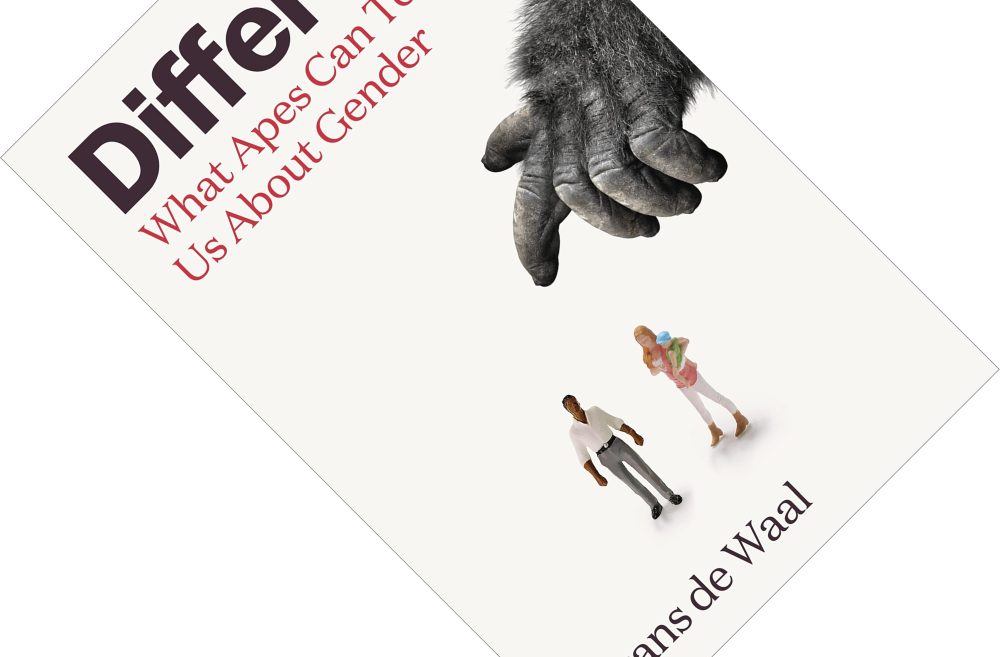by LEON VLIEGER

Before delving in, it is worth highlighting a few disclaimers. In his comparisons between primates and humans, De Waal omits human behaviour without proper animal parallels. These comparisons are always made in the understanding that today’s primates are not our ancestors, but models of our shared ancestor, and that “they offer a comparison, not a model for us to emulate” (p. 8). He also does not discuss the role of hormones or neurobiology for the simple reason these are outside his wheelhouse. De Waal reminds readers that studying the biological roots of behaviour does not endorse it—research should not be used to excuse bad behaviour and he opposes the misogyny, homophobia, and transphobia characterising discussions. And then there is the linguistic confusion over sex and gender. Yes, the former is biological and the latter cultural, but “despite their different meanings, these two terms remain joined at the hip” (p. 13), you cannot discuss one without the other. Echoing the skillful distinction he made between feelings and emotions in his previous book Mama’s Last Hug, De Waal here offers a similarly thoughtful description: “gender is like a cultural coat that the sexes walk around in. It relates to our expectations of women and men, which vary from society to society and change through the ages” (p. 42). Finally, he makes the useful distinction between gender identity (i.e. what you identify as) and cultural gender roles.
What makes Different such a breath of fresh air is that science trumps ideology for De Waal. The problem he sees is that many gender debates ignore or flat-out deny biology because it clashes with their message. Except when it does not. So, feminists love bonobos as they can be presented as “proof that male dominance is not hardwired in us” (p. 104) but they dislike chimpanzee research that suggests the opposite, while gay communities welcome biological observations of animal homosexuality in their fight against homophobia. This is ideological cherry-picking, “why not let biology shine its light on all gender-related issues?” (p. 286). Another disclaimer seems in order here: De Waal is explicit about the pointlessness of past nature/nurture debates, “every human trait reflects an interplay between genes and environment” (p. 43). But, like it or not, men and women differ and this book will not sugarcoat reality with political correctness. However, if you came here looking for ammunition for your next tweet-rage, this is not the book for you. De Waal cuts across numerous heated debates at right angles, offering observations, insights, and results that will simultaneously upset and delight people in all ideological camps.
Thus, some observations here will not be welcomed by feminists because they reinforce traditional gender roles. Yes, women are naturally more nurturing towards infants—this is simply a universal mammalian trait. Though, adds De Waal, calling this a maternal instinct obscures the fact that such skills have to be acquired in life, as exemplified by ape orphans in zoos who as adults have no idea what to do with a newborn. And, yes, play behaviour in primates and humans follows traditional gender patterns. He is particularly critical of parents who insist on a gender-neutral upbringing “in reaction to society’s gender stereotyping and the associated inequality. Note, however, that only one of the two words in gender inequality refers to a problem, and it’s not gender. No one would propose to fight racism by urging people of different races to try to look more alike” (p. 49). But other observations might strike you as progressive. Do men have a bigger sex drive than women? This seems to be true of male chimpanzees but is exaggerated in humans. De Waal repeatedly criticizes psychological research in this book for relying on questionnaires and self-reporting. This rarely yields reliable data. There is similarly no reason to think that men are natural-born leaders; research on primates shows the influence wielded by female leaders. And homosexual behaviour has now been widely documented in the animal kingdom and is neither anomalous nor an evolutionary puzzle; De Waal proposes a logical explanation here.
The fact that De Waal is not beholden to ideology shows in another way. Different is not a book to exclusively wade into human gender debates while flying the primate flag. For a primatologist, there are so many other interesting and important topics that come up once you start talking about sex and sexuality. De Waal recounts a fair bit of the history of primatological and anthropological research here. This matters because it explains where our ingrained ideas about our primate cousins and ourselves come from. Furthermore, he discusses plenty of research on chimpanzees and bonobos for its own sake as it is just incredibly interesting.
Inquisitive Biologist for more